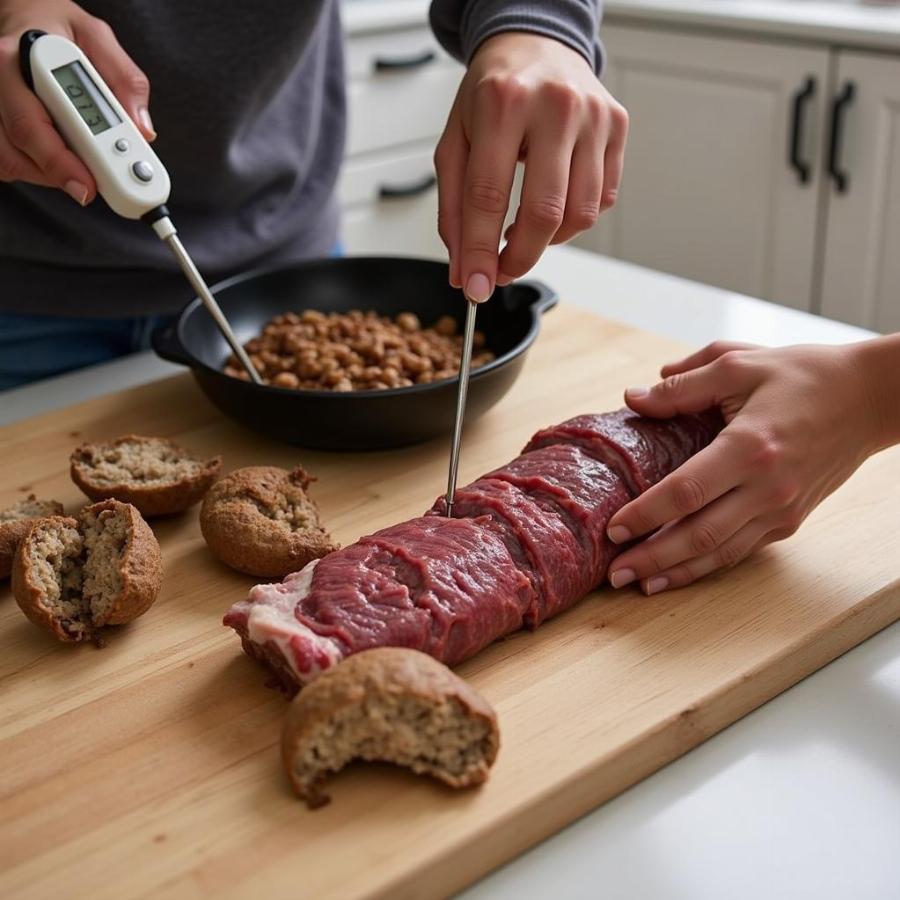Deer meat, also known as venison, has gained popularity as a novel protein source for dogs. But is it a safe and nutritious option? This article delves into the benefits and risks of feeding deer meat to your canine companion, providing you with the information you need to make informed decisions about their diet.
Understanding the Nutritional Benefits of Venison for Dogs
Venison is a lean protein source packed with essential nutrients like iron, B vitamins, and zinc. It’s lower in fat and cholesterol than beef, making it a healthier alternative for dogs prone to weight gain or heart issues. The high protein content supports muscle development and overall growth, particularly beneficial for active dogs.
Is Deer Meat Easier to Digest for Dogs?
Compared to some other red meats, venison is often easier for dogs to digest. Its lean nature and lower fat content contribute to smoother digestion, reducing the risk of stomach upset. However, individual dog sensitivities can vary, so introducing venison gradually is crucial. Always monitor your dog for any signs of digestive issues like vomiting or diarrhea.
Preparing Deer Meat for Your Dog: Raw vs. Cooked
The debate surrounding raw vs. cooked meat for dogs extends to venison. While raw venison retains more nutrients, it also carries the risk of bacterial contamination. Thoroughly cooking the meat to an internal temperature of 165°F (74°C) eliminates this risk.  Nấu ăn thịt nai cho chó
Nấu ăn thịt nai cho chó
Can Dogs Eat Deer Bones?
Deer bones, especially cooked ones, can splinter and pose a choking hazard or cause internal injuries. If you choose to give your dog deer bones, opt for large, raw, meaty bones that are less likely to splinter. Always supervise your dog when they are chewing on bones. is deer meat good for dogs
Potential Risks and Considerations When Feeding Deer Meat to Dogs
While generally safe, introducing venison to your dog’s diet comes with potential risks. Chronic Wasting Disease (CWD), a prion disease affecting deer, raises concerns. Although transmission to dogs is rare, it’s advisable to source venison from reputable hunters or suppliers who test their deer for CWD. raw venison for dogs
Allergies and Intolerances
Some dogs might be allergic or intolerant to venison. Introduce it slowly and watch for signs like itching, skin redness, vomiting, or diarrhea. If any of these occur, discontinue feeding venison and consult your veterinarian.
Transitioning Your Dog to a Deer Meat Diet
Transitioning your dog to a venison-based diet should be gradual to avoid digestive upset. Start by mixing small amounts of cooked or raw venison with their current food, gradually increasing the proportion of venison over several days or weeks. deer and the dog
Balancing Your Dog’s Diet with Venison
Venison should be part of a balanced diet. Consult your veterinarian or a canine nutritionist to ensure your dog receives all necessary vitamins, minerals, and other nutrients. raw meaty bones for dogs
Conclusion: Is Deer Meat a Good Choice for Your Dog?
Deer meat can be a healthy and nutritious addition to your dog’s diet. Its lean protein and rich nutrient profile offer numerous benefits. However, responsible sourcing and proper preparation are crucial. Always consult with your veterinarian before making significant changes to your dog’s diet, particularly if they have existing health conditions. deer bones for dogs
FAQ:
- Can puppies eat deer meat? Yes, but introduce it gradually and ensure it’s cooked thoroughly.
- How much deer meat should I feed my dog? Consult your veterinarian for personalized guidance.
- Can I mix deer meat with other protein sources? Yes, but ensure a balanced diet.
- Is deer meat good for dogs with allergies? It can be a good alternative, but some dogs may still be allergic.
- Where can I source deer meat for my dog? Reputable hunters, butchers, or pet food suppliers.
- Is it safe to feed deer heart to my dog? Yes, in moderation, as part of a balanced raw diet.
- Can dogs eat deer antlers? Yes, they can chew on them, but ensure they are not sharp and can’t be swallowed.